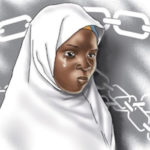She was forced to marry against her will and when she refused to consummate the marriage, her husband brought his brother and cousins and they held her while he raped her. He tried same next day but she stabbed him with a knife which he used to threaten her. She ran home where she was handed over to the police by her father and was sentenced to death on May 10.
This is the most recent scenario in Sudan, North Africa which has been ranked fifth on international child marriage rates. Statistics from UNICEF in 2017 show that 9 per cent were married off by the time they clocked 15 while 52 per cent get married by 18, thus implying that approximately one in three girls in Sudan is married before their 18th birthday.
In Nigeria, the story is not different as 43 per cent of girls are married off before their 18th birthday and 17 per cent are married before they turn 15. According to UNICEF, State of the World’s Children, 2017 report, Nigeria currently sits at international ranking of 11th on child marriage rates though the prevalence of child marriage varies widely from one region to another, with figures as high as 76 per cent in the North West region and as low as 10 per cent in the South East. Available data shows a nine per cent decline in the prevalence of child marriage since 2003. However, action is still needed to prevent thousands of girls from being married in the coming years.
ALSO READ: Two parallel wires that can never meet
Child marriage directly hinders the achievement of at least six of the Sustainable Development Goals. Child marriage violates girls’ rights to health, education and opportunity. It exposes girls to violence throughout their lives, and traps them in a cycle of poverty. The indigenous African traditional system restricts the education of the girl child to the well-known form of informal domestic education in which she receives training at home on hygiene, cooking, laundry and general home management. Some parents would easily give their girl child’s hand in marriage to some older, wealthier man believing that the marriage will bring some economic gains their way.
Apart from obvious reasons of poverty, major factors are responsible for child brides; these include traditional practices, religious or customary laws and social/ family honour.
Though some believe that this idea is fast becoming a thing of the past considering the ever-dynamic nature of peoples and cultures all over the world, these recent stories beg to differ.
It is not becoming a thing of the past rather it is becoming less pronounced but still in effect. Child marriage violates the rights of children; it affects both boys and girls, but it is more common among girls and child brides are also subject to extreme domestic and sexual abuse, causing psychological, physical harm and dangerous pregnancies.
Ekene Odigwe
@Ekeneodigwe






